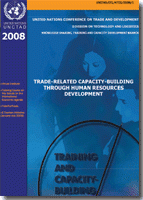
In 2008, the global economy began a retrenchment as a result of the international financial crisis, and as several economies witnessed a slowdown in growth and the possibility of recession. The effects of economic contraction on budgetary expenditures in developed countries may affect the level of development support they provide. These same effects will also heighten the need for knowledge and local expertise in developing countries to steer themselves through the crisis, to lay down foundations for sustainable economic growth and development, and to protect themselves against future crises. In this regard, the availability of locally grounded training, education and research in the areas of trade, economics and development will further gain in importance.
UNCTAD´s twelfth quadrennial conference (UNCTAD XII) held in Accra, Ghana, in April 2008 had two positive impacts on the work and activities of the Knowledge Sharing, Training and Capacity Development Branch (KSTCD). First, the Accra Accord, which establishes the UNCTAD´s mandate for the next four years, reaffirmed the value of training, education and research for economic development, and granted the Virtual Institute, the Course on Key Issues on the International Economic Agenda and TrainForTrade a consolidated mandate to continue and expand their activities in the above fields. Second, the e-Tourism programme was moved into another division to strengthen the work on small and medium-sized enterprise (SME) development, allowing the KSTCD Branch to focus exclusively on training and capacity-building. Whilst this document contains information about the e-Tourism activities for the first half of 2008, its focus and perspective are on the programmes of the Virtual Institute, the Course on Key Issues on the International Economic Agenda and TrainForTrade.
The three capacity-building programmes of the KSTCD Branch address challenges in developing country training and research institutions through different and complementary activities, tailored to the needs of their specific target audiences. The UNCTAD Virtual Institute on Trade and Development works mainly with academia and to some extent research institutes in developing countries; the Course on Key Issues on the International Economic Agenda (so-called Paragraph 166 course) is UNCTAD´s flagship training course for policymakers on trade and development; and TrainForTrade works with trade practitioners, trade officials and private enterprise.
UNCTAD believes that access to external technical expertise alone is not enough to develop the skill and knowledge capacities of developing countries. The KSTCD Branch therefore emphasizes the need to develop and support local institutions to ensure the long-term sustainability of its capacitybuilding efforts. To this end, the three programmes of the KSTCD Branch have integrated various tools and methods into their work, such as information and communication technologies (ICTs) and networking arrangements, as well as drawing on their pedagogical advantages in the creation of high-quality materials and the delivery of training. The KSTCD Branch also leverages various partnerships, both across divisions within UNCTAD and with partner institutions, such as the World Trade Organisation (WTO) and United Nations regional commissions.
This document summarises the main achievements and best practices in the course of the KSTCD Branch´s activities in 2008.


